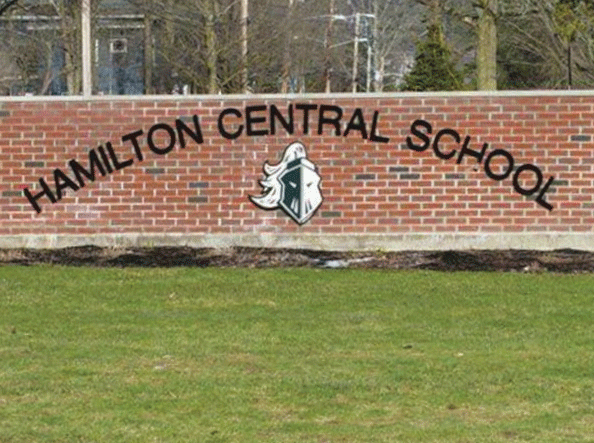Trivisonno Advises on Education and Volunteering

Hamilton Central literary specialistCapri Trivisonno shares her experience fostering meaningful relationships with students.
Literary specialist Capri Trivisonno spoke to an audience of students and faculty on October 5 in her discussion titled, “Creating an Effective Classroom Atmosphere.” Trivisonno works at Hamilton Central School and serves as a community partner for the Max A. Shacknai Center for Outreach, Volunteerism and Education (COVE) group Liberty Kids. Liberty Kids is one of the COVE’s 40 volunteer teams. It exists as a literary program geared towards first and second graders who struggle with reading. Colgate students are matched with Hamilton elementary students as they read and complete activities one-on-one. COVE teams Liberty Kids and Hamilton Outdoor Group sponsored the brown bag discussion.
Trivisonno’s lecture focused on lessons she learned while working in education that she believes translate to student volunteers and individuals pursuing careers in education. She highlighted the importance of treating students with respect and holding them accountable for their actions. Trivisonno explained that continuous support and positive reinforcement are necessary for success in the classroom.
“We’re here for the kids and we’re here to build these strong relationships. A lot of times, as a teacher, your lessons won’t go as planned. Sometimes I’ll have a great lesson and it won’t go as well as I want it too. But at the end of the day, what’s most important is that you’re there for the kids, you’re positive and you’re supporting them through everything,” Trivisonno said. “When children feel comfortable and supported, it allows them to take chances and to succeed. They step outside of the box.”
Senior Dan Mahoney echoed this sentiment about the importance of volunteering and serving the community.
“Volunteering for me is an opportunity to step away from my life at Colgate and make a positive impact in the lives of children. Without people pitching in, there can’t be a community. We are the ones who need to come together for each other. That’s what makes everyone better,” Mahoney said.
During her discussion, Trivisonno expressed the importance of not being best friends with the children you work with in order to gain respect. When dealing with poor behavior, she recommends implementing consequences instead of punishments, changing location to provide emotional distance from a problem at hand, re-doing a task and asking students to take a break from their activities to think about making better choices.
“I think, as we know, the most challenging students who act out are the ones who really need us the most. A lot of children at home are not taught right from wrong and why something is okay or not okay. And it’s our job to teach them. We want them to be kind and respectful,” Trivisonno said.
Through this all, she believes that teachers need to remain positive.
“If a child does not feel comfortable and safe in their environment, they are not going to try. Unfortunately, in a lot of students’ lives, they may have a negative home life. If children always feel negative, they almost get stuck in a little bubble. It’s our job to pull them out of that. To show them that there is something we can always work towards and people that are supporting them and believing in them.”
Reflection and willingness to adapt from mistakes are a large part of the teaching process.
“Reflect as much as possible! Whether it’s about a lesson or a conversation with a student, reflecting on situations will only make you a stronger teacher,” Trivisonno said.
As an educator, she believes that discipline can also be done in a positive manner. She emphasized the importance of prediction and the use of the word yet to signal future progress to children. She also recommends using a sandwich approach where a suggestion of something to work on is sandwiched between two positive reinforcements.
“Make sure the point is very clear. If you just tell a student, this is why you’re wrong and just talk at them, sometimes they just won’t pay attention and it will go right over their head. A directed chat with a child can be helpful. Ask them what better choices they think they can make when they reenter the classroom. Allowing the kids to have choice empowers them a little bit and allows them to internalize it,” Trivisonno said.
Liberty Kids leaders junior Molly Lieberman and junior Maggie McDonnell have been involved in the program for three years. Lieberman reflected on her involvement with the COVE.
“I love how the COVE allows me to step out of the ‘Colgate Bubble’ and interact with community members. It’s so fun when the librarians at the Hamilton Library recognize me and we get to talk about the books I’m bringing to the Hamilton Central students,” Lieberman said.
Trivisonno values the partnership that exists between Liberty Kids, the numerous other COVE teams and the local community.
“Volunteering at Hamilton Central is a great way to give back to this wonderful community. It is a useful learning experience to have the opportunity to work with children, to assist a classroom or to support the athletics. Creating meaningful relationships with the children is the most important part. The more support, encouragement, and optimism in their lives, the better,” she said.
Liberty Kids is currently looking for more team members to engage in their weekly meetings at Hamilton Central. For more information, visit the COVE, located in Lathrop 109 or contact the office at their e-mail address,
Contact Gaby Bianchi



